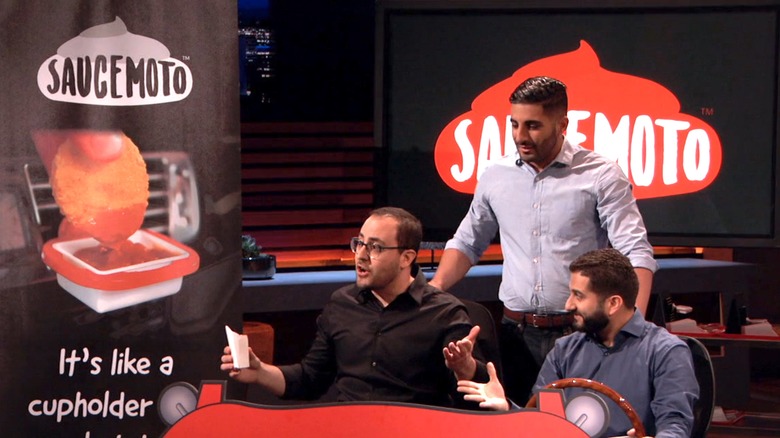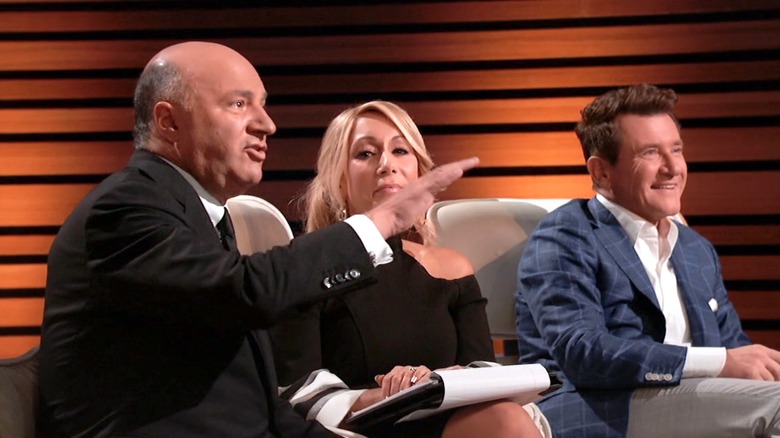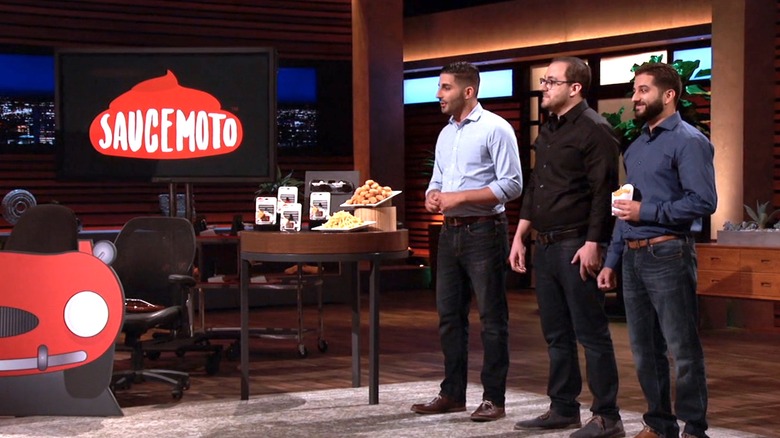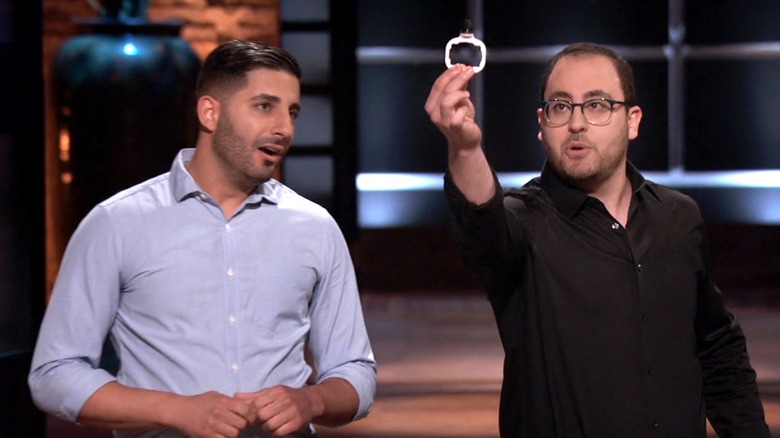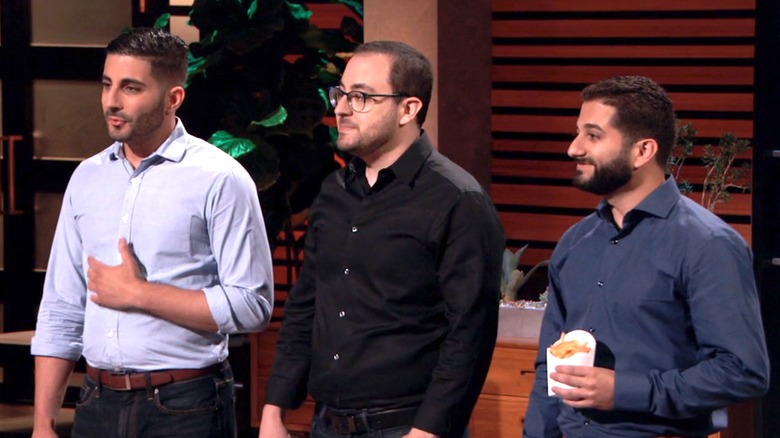What Happened To Saucemoto Car Sauce Holder From Shark Tank Season 10?
We may receive a commission on purchases made from links.
Some products that have made their debut on ABC's long-running reality hit "Shark Tank" look like no-brainers in regards to their potential for market domination. There has, of course, been a truly far-out pitch or two over the years, like the Sullivan hurricane generator, that've encouraged an easy "I'm out" from the likes of soon-to-exit "Shark Tank" star Mark Cuban. But one might argue that the series' narrative sweet spot is watching clever inventors and entrepreneurs pitch those in-between products that don't have market success stamped all over them — especially when the folks pitching them lean into the quirk during their presentation.
Indeed, theatrical pitches tend to be the most memorable among the thousands that have made it to air over the series' lengthy primetime run, and if you were watching "Shark Tank" in Season 10, you might agree that the Saucemoto pitch from Episode 22 ranks among the most unforgettable. Of course, part of what made the Saucemoto pitch so memorable is the product, which steadies fast-food sauce containers by attaching to a vehicle's air vent, letting occupants dip their fries and nuggets without spilling the sauce.
Kitsch value aside, the device displays a degree of simple genius on par with the equally memorable, and SlashGear-reviewed, Drop Stop seat-gap filler from Season 4. Thankfully, the Saucemoto inventors were as aware of their product's low-key absurdity as well as its effectiveness, giddily showcasing some requisite quirk with their pitch. Here's what happened to Saucemoto after "Shark Tank."
What happened to Saucemoto on Shark Tank?
The Ohio-based trio behind Saucemoto entered the "Shark Tank" studio boasting cheeky confidence, saying the idea came into being on a road trip in which one of them spilled some dipping sauce inside his buddy's brand new car. Determined to put an end to the plague of spilled sauces, the friends conjured the potentially game-changing device, and sought "Shark Tank" funding to bring it to the masses.
The group's camaraderie was evident from the first moments of the pitch, with the Saucemoto brain trust hamming it up as they teased their concept, and even more so when the sauce holder makes its appearance. The group even brought a cardboard car cutout and acted out the holder's usefulness. While the panelists were both entertained and clearly intrigued by the device's almost-no-cost production price, it was still unclear whether any would actually pony up and invest in Saucemoto.
The Saucemoto team couldn't close a deal with either Mark Cuban, Barbara Corcoran, or Laurie Greiner. However, Kevin O'Leary and Robert Herjavec did not flinch at the $45,000 ask, though they wanted more than the offered 15% equity in Saucemoto. Herjavec countered with $45,000 at 40% and O'Leary offered the same amount for 50% equity. After some brief negotiating, the Saucemoto team got O'Leary down to 25% equity for the $45,000, and closed the deal at that price.
What happened to Saucemoto after Shark Tank?
Interestingly, neither O'Leary nor Herjavec seemed concerned with making the Saucemoto the next must-have for fast-food-loving car owners. In fact, both sharks made clear that their investment was more in the company's founders, who had displayed serious acumen in manufacturing and marketing their device, with their work having already resulted in the sale of 12,000 units and $75,000 in revenue.
Apart from marketing, the Saucemoto crew was, perhaps, most adept at identifying and meeting a not-so-niche market demand, as Americans have been dining in their vehicles with increasing regularity. Though official sales figures are not available, Saucemoto reportedly sold out its entire stock of sauce holders after the 2019 "Shark Tank" appearance. Likewise, the exposure helped the Saucemoto team get its product onto the shelves of retail outlets like AutoZone, JoAnn Fabrics, and Advance Auto Parts. The company even had a brief promotional run with fast-food chain Zaxby's.
Though some reports suggest O'Leary facilitated the Zaxby's promo, it seems the "Shark Tank" deal he struck with the Saucemoto team never actually closed, with co-founder Tony Lahood saying in a 2023 interview with the "Everything Money" podcast, "at the end of the day, we didn't see eye to eye on some of the terms." Despite the O'Leary deal not closing, Saucemoto has continued to thrive since its "Shark Tank" appearance, with products not only available in the company's own web store, but also selling through major online retailers like Amazon.
What's next for Saucemoto?
As evinced by its 4.6-out-of-5-stars customer rating on Amazon, Saucemoto users generally hail it as fun and functional, with many noting they'd purchased or received it as a gag gift and ended up using it regularly. During his "Everything Money" interview, Lahood said gifting has become a legitimate sweet spot for Saucemoto, and is still selling well for him and his partners.
In fact, Lahood said, the sales boost Saucemoto saw after the "Shark Tank" appearance was a "tiny little blip" compared with its huge bump in sales after the sauce holder earned "Tik Tok Made Me Buy It" status. And in the years since their "Shark Tank" appearance, the trio has grown its brand with new products, with the Saucemoto Amazon store currently listing a cleverly designed "Sauce-Cuterie" charcuterie board with compartments for six different dipping sauces, and a doughnut-inspired BPA-free ice tray that delivers round blender- and water-bottle-friendly ice with a hole in the middle.
Those last two products aren't available directly from Saucemoto, so they may not have sold quite as well as the company's OG offering. Likewise, it's not entirely clear where Saucemoto goes from here, though Lahood told "Everything Money" it does have more new products in the works.
What are the Saucemoto founders up to today?
While Saucemoto's car sauce holder continues to sell, the company has seen more than a few copycat products spring up in the wake of the "Shark Tank" appearance. While Saucemoto's founders have largely let the imitators play in the marketplace, they deemed one that appeared on shelves at retail chain Five Below a little too close to their design, and the companies have been mired in litigation over patent infringement. It's unclear whether the companies have reached any sort of settlement over the claims.
Legal entanglements aside, as Lahood said during his "Everything Money" interview, Saucemoto has continued in ways he and his partners couldn't have anticipated. So much that he says his partners have left full-time positions with other companies to run Saucemoto full-time — an assertion supported by the employment status on Michael Koury's and William Moujaes' individual Linkedin pages.
Lahood apparently hadn't yet made that leap at the time of the podcast interview, with the entrepreneur saying he still had interests in the Cleveland bar scene. However, Saucemoto is currently listed as his primary source of employment on Linkedin, so he's clearly as invested in the sauce-holder scene as his partners are.
